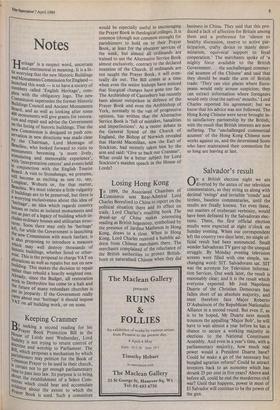Keeping Cranmer B Y seeking a second reading for his Prayer
Book Protection Bill in the stio,use of Lords next Wednesday, Lord u,soctrine ,,lkieleY is not trying to return control of and worship to Parliament. The which proposes a mechanism by which Parishioners may petition for the Book of Common Prayer to be used in their church, s. certain not to get enough parliamentary unle to pass into law. Its purpose is to bring about the establishment of a Select Com- mittee which could hear and accumulate evb idence about the extent to which the rraYer Book is used. Such a committee
would be especially useful in encouraging the Prayer Book in theological colleges. It is common (though not common enough) for parishioners to hold on to their Prayer Book, at least for the obscurer services of the week, but almost all ordinands are trained to use the Alternative Service Book almost exclusively, contrary to the declared intention of the Church. If ordinands are not taught the Prayer Book, it will even- tually die out. The Bill comes at a time when even the senior bishops have noticed that liturgical changes have gone too far. The Archbishop of Canterbury has recently been almost outspoken in defence of the Prayer Book and even the Archbishop of York, normally in the van of progressive opinion, has written that the Alternative Service Book is `full of mistakes, banalities and imperfections' . At a recent debate in the General Synod of the Church of England, the Bishop of Norwich revealed that Harold Macmillan, now the Earl of Stockton, had recently taken him by the arm and said: 'Give us back our Cranmer'. What could be a better subject for Lord Stockton's maiden speech in the House of Lords?










































 Previous page
Previous page